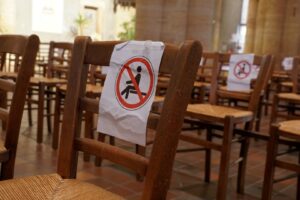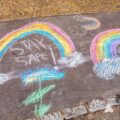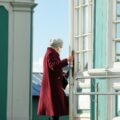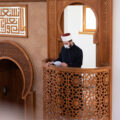COVID-19 and freedom of religion
COVID-19 and freedom of religion
COVID-19 raised the question of balance between the collective and individual rights. The approach to restrictions and vaccinations proved a real puzzle.
The death of Marcus Lamb
On the 1st of December 2021, the news of Marcus Lamb’s death due to COVID-related pulmonary disease spread around the world.[1] Lamb was one of the most vocal anti-vaccination campaigners, the views that he shared globally over the Daystar Television Network he founded. Both Lamb and Daystar were more broadly known for presenting vaccines as a spiritual attack of the Evil against Christians and their freedoms.[2]
The example of Lamb shows that the outbreak of COVID-19 and the subsequent restrictions and vaccination rollout constituted an intersection in which the values of public health and collective good clashed with the ideas of individual freedom, including freedom of religion or belief. By that, it highlighted specific challenges in balancing them not only for politicians and policymakers, but also individuals in spaces such as workplaces, places of worship, or even family gatherings.
Lockdowns and restrictions on church services
One of the first significant clashes between the two occurred during the early imposition of restrictions with the first wave of the COVID-19 outbreak in Europe. The availability, or lack thereof, of the places of worship and any activity within them was among the most crucial issues at the time. Some countries, like Poland, did not close their churches even when other significant restrictions were introduced, and were slow to impose any limitations on numbers of participants.[3] Countries such as England and France went in the other direction and suspended all public worship for significant amounts of time.[4] Yet others, for example Spain, quickly limited the numbers of worship participants without suspending it altogether.[5]
Pushback against the restrictions
Such restrictions caused significant pushback from many, especially Catholics for whom Sunday Mass celebration is a commandment. In Ireland, the closure of the churches by the government has brought comparisons to Oliver Cromwell and the 17th-century anti-Catholic measures.[6] Some individual priests were also going as far as to claim that consecration secures one from the disease.[7] Many bishops and episcopates in Europe, while at first complying with the regulations,[8] [9] decried them as discriminatory when businesses were reopened before places of worship. This also led to a greater pushback when the government wanted to return to restrictions with subsequent waves of the virus outbreak.[10]
A balancing act
Larger religious organisations began to underline the need for an adequate balancing of different values. For example, the World Council of Churches wrote in its ‘Reflections on Freedom of Religion or Belief during the fight against the COVID-19 pandemic’ that 2020 was a historic year for Christianity in Europe, because of the unique situation in which many Christians could not participate in Easter celebrations due to legal measures. However, as they underlined, the protection of the weak and vulnerable was also of high importance from a religious perspective.[11]
The need for a more adapted approach
Some also criticised the states for overt limitations introduced not because of safety but out of other arbitrary principles. For example, Cardinal Jean-Claude Hollerich, the president of the Commission of the Bishops’ Conferences of the European Union, criticised European states for not differentiating between different types of services based on their health threat, but suspending all services in a one-for-all system. As he pointed out, this type of imposed equality was not demanded by different religious denominations but imposed from above. As an alternative, he referred to the interfaith collaboration between Catholics, Muslims, and Jews in Luxembourg, which led to the development of particular safety regulations adapted to concrete practices.[12]
Vaccination rollout and religious objection
Another clash between public health and religious beliefs occurred with the vaccination rollout. While vaccination opposition on religious grounds has been an enduring phenomenon long before COVID-19, renewed urgency took place during the pandemic. Although many religious leaders called on people to get vaccinated,[13] [14] there were also religious communities and individual believers whose doctrine rejected vaccines or their particular ingredients (e.g., those derived in some way from aborted fetuses) that warranted protection under Article 10 of the European Convention of Human Rights.[15]
Excused by a prayer book?
In some cases, however, freedom of religion has been used to circumvent restrictions. For example, Krzysztof M. Zalewski, in an opinion piece for Krytyka Polityczna, described an anecdotal story of his colleague, an Austrian businessman. As coverage of basic religious needs is among the plausible reasons to leave the house, the Austrian businessman is moving around with a prayer book.[16]
The need for scalpel, not a blunt tool
All of these stories highlight how difficult and multi-level the issue of balancing religious needs is in a time like that of the COVID-19 pandemic, with no simple solutions on how to handle it. One thing is clear – development of regulations, policies, and recommendations in situations that require limitation of individual freedoms on behalf of the common good necessitate a greater attention to detail. Scalpel is needed in place of a blunt tool of a simple suspension of public worship or complete lack thereof.
You can use the free EARS Dashboard to learn more about trends and developments on the topic of religion and society. Hundreds of article summaries from all over the world were added in the past month!
Sources
[1] Anti-vaxx Christian broadcaster Marcus Lamb dies of Covid aged 64
[2] Antyszczepionkowy guru Marcus Lamb zmarł na COVID-19
[3] Poland tightens lockdown but keeps churches open for Easter
[4] As Europe faces new lockdowns, no uniformity on suspending Mass
[5] As Europe faces new lockdowns, no uniformity on suspending Mass
[6] Taoiseach, Government compared to Cromwell over restrictions, church closures
[7] “Konsekracja dłoni chroni przed koronawirusem”. Jest stanowisko Episkopatu Polski
[8] Biskupi znoszą dyspensę od uczestnictwa w niedzielnej mszy
[9] Catholic bishops tighten guidelines on church celebrations amid lockdown in Austria
[10] Churches Push Back Against Coronavirus Restrictions – WSJ
[11] Conference of European Churches reflects on freedom of religion during COVID-19 pandemic
[12] Kard. Jean-Claude Hollerich: Boję się fanatycznego katolicyzmu
[13] Have the vaccine, European bishops urge, as churches in the Continent face new restrictions
[14] Holy Land Jewish, Muslim, Christian, Druze, Baháʼí reps urge world to vaccinate
[15] Compulsory Vaccination in a Fundamental Rights Perspective: Lessons from the ECtHR
[16] Jak przechytrzyć lockdown: metoda na austriackiego biznesmena z modlitewnikiem






